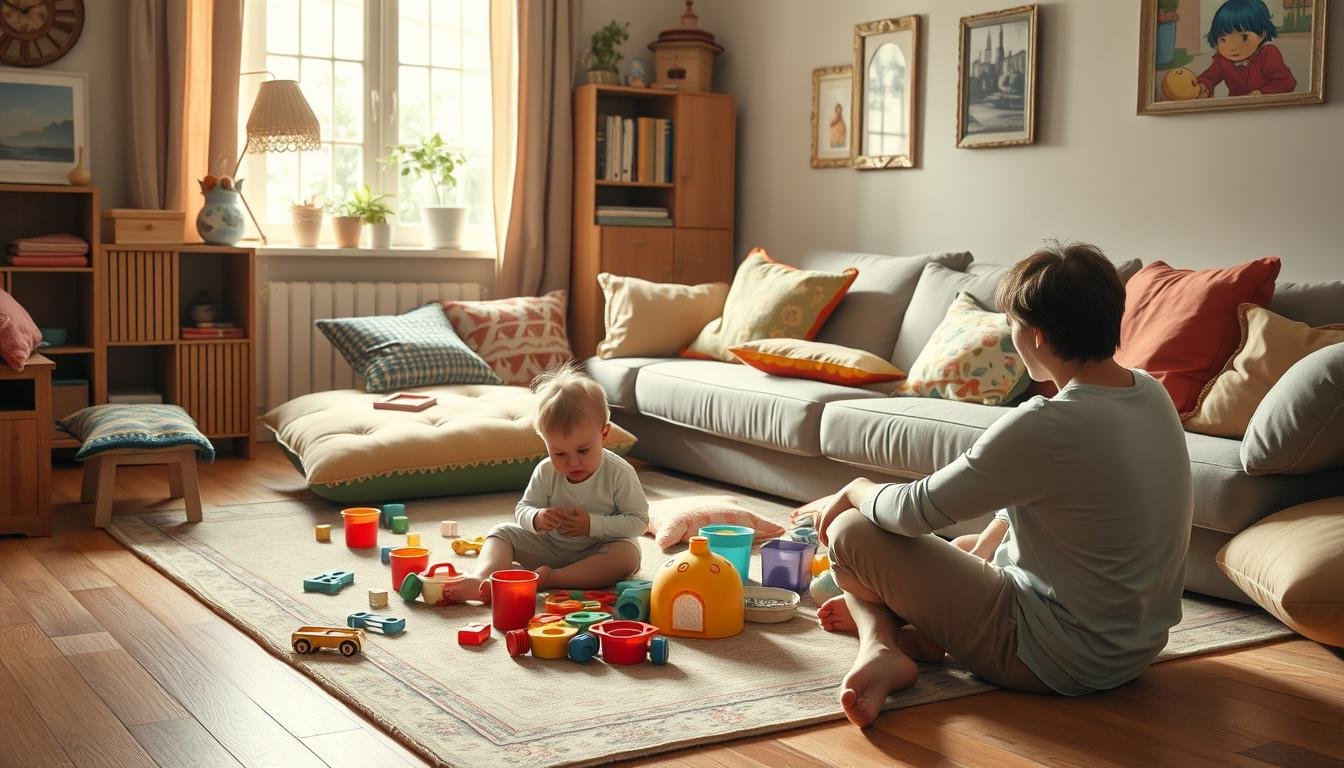Are you a parent who puts your child’s happiness first? You might be using a permissive parenting style. This approach is warm but also lenient. Diana Baumrind, a child psychologist, identified four main parenting styles, including permissive1. To learn more, visit parenting styles and see how it affects your child.
Permissive parenting means not setting strict rules. Parents focus on giving their kids freedom. But, this can cause problems like anxiety and depression in kids1. It can also make kids more resourceful but also more likely to have behavioral issues23.
Key Takeaways
- Permissive parenting is a style of child-rearing that features being nurturing and warm, and being reluctant to impose limits.
- Permissive parenting can lead to specific negative outcomes, including a higher risk of anxiety and depression symptoms in children1.
- Children raised by permissive parents may have higher levels of self-esteem compared to those raised by authoritarian parents3.
- Permissive parenting is associated with higher levels of aggression, particular in 8-year-old girls with high negative emotionality2.
- Implementing structured guidelines can help families achieve better emotional and behavioral outcomes1.
- Children from permissive households are linked with higher childhood Body Mass Index (BMI) relative to those from authoritative families2.
Understanding What is Permissive Parenting Styles: The Basics
Permissive parenting focuses on nurturing and supporting children without strict discipline4. It’s different from authoritarian parenting, which is strict. Permissive parents let their kids make choices and learn from mistakes5.
This style of parenting aims to create a warm, supportive environment for kids to grow6. Permissive parents care a lot about their children’s feelings and self-esteem. They use positive rewards to encourage good behavior6.
Studies show permissive parenting can have both good and bad effects on kids4. Kids raised this way might be more confident but also more impulsive5. Knowing about permissive parenting helps parents decide how to raise their kids in a supportive way.
The Psychology Behind Permissive Parenting

Permissive parenting is linked to positive traits like high self-esteem and social skills. Children are free to choose and explore7. Yet, it can also lead to issues like a lack of self-discipline and responsibility8.
Some characteristics of permissive parenting include being very responsive to children’s needs but not controlling7. This can give children a lot of freedom but also make it hard for them to control themselves7. Research shows kids from permissive homes might take more risks and do worse in school than those from more structured homes8.
A study showed permissive homes have much less consistent rules than other types of homes7. This lack of structure can make kids feel entitled and disrespect authority7. But, it can also help kids feel creative and confident as they explore and decide for themselves7.
Tell-Tale Signs You’re a Permissive Parent
Are you wondering if you’re a permissive parent? Permissive parenting means giving kids lots of freedom and making few demands. This style is different from authoritative parenting, which is often debated910.
Signs of permissive parenting include being too lenient and not setting clear rules. Kids may have trouble controlling themselves because of this9. On the other hand, authoritative parenting is linked to better outcomes for kids. They become more confident and responsible10.
Permissive parenting can have both good and bad effects. Kids may feel good about themselves but struggle with social skills and making decisions910. To see if you’re a permissive parent, look out for these signs:
- Low expectations and minimal discipline
- Allowing children significant freedom in making choices
- Inconsistent boundary setting
Breaking Down the Parent-Child Dynamic in Permissive Households

Permissive parenting can have big consequences on how parents and kids interact. Parents often find it hard to set rules and discipline their children11. This parenting style is warm but lacks control, causing kids to act bossy, dependent, and impulsive12.
Research shows kids from permissive homes tend to be more impulsive and lack self-control11. They also might not do well in school. Plus, permissive parenting can lead to kids showing aggressive and delinquent behavior13. The consequences of permissive parenting can affect a child’s behavior, emotions, and social skills.
Here are some key points to consider:
- Permissive parenting is linked to lower cognitive skills in kids11.
- Children from permissive homes are more likely to have health issues like obesity13.
- Permissive parenting can cause kids to lack self-control and make poor choices12.
Parents need to know the consequences of permissive parenting. They should aim for a balance of warmth and control11. This way, they can help their kids grow into confident, responsible, and well-adjusted people.
Permissive vs. Authoritative: Understanding the Key Differences
Two main parenting styles are often talked about: permissive and authoritative. Knowing the differences can help you choose the best parenting approach for your family. Permissive parenting focuses on being very responsive but doesn’t set many rules. This creates a caring environment with few limits14.
On the other hand, authoritative parenting strikes a balance. It offers structure while also giving children independence. This helps kids feel confident and sure of their choices15.
Research shows that kids raised by authoritative parents tend to have better self-esteem and life quality. They do better than those raised by authoritarian or permissive parents15. But, permissive parenting can cause problems like poor emotional control, rebellion, or anxiety14. For more on parenting styles, check out this website.
Decision-Making Processes
In permissive parenting, kids make most of the decisions. This can result in a lack of rules14. Authoritative parenting, on the other hand, sets clear expectations and lets kids make some choices15.
Rule Implementation
Authoritative parents enforce rules fairly and consistently. Permissive parents often don’t set rules or enforce consequences14. This helps kids learn responsibility and self-discipline15.
The Impact on Child Development
As a parent, you want the best for your child. It’s important to know how permissive parenting affects their growth. Children raised with permissive parenting often struggle with self-discipline and self-regulation16. This can make it hard for them to get along with others and respect authority.
Permissive parenting can also hurt a child’s school performance. They might not do well in school17 or take their homework seriously. It can also lead to risky behaviors like drug use and heavy drinking18. Children from permissive homes may also have lower emotional intelligence and poor social skills16.
To understand the downsides of permissive parenting, check out the best books on parenting teenagers. These books provide useful advice for better parenting. Knowing the effects of permissive parenting helps you make choices that support your child’s growth into a responsible person.
Making Permissive Parenting Work for Your Family
As a parent, you want the best for your child. Permissive parenting can be a good choice if done right. It’s about being warm but not strict, seen in 30% of parents surveyed19. To succeed, knowing how to set limits and discipline is key.
Finding a balance in permissive parenting is tough. Kids from permissive homes might take more risks and use drugs more than others19. Yet, with the right steps, it can be a great way to raise your child. Here are some tips to help:
- Set clear boundaries and expectations while giving your child freedom to choose.
- Use positive reinforcement like praise and rewards for good behavior.
- Be consistent in discipline, avoiding being too lenient or strict.
By following these tips and understanding parenting styles, you can make permissive parenting work. It’s not about letting your child do whatever they want. It’s about finding a balance between freedom and responsibility2.
| Parenting Style | Characteristics | Effects on Children |
|---|---|---|
| Permissive | High warmth, low structure and discipline | Increased risk of substance abuse, poor self-regulation |
| Authoritative | High warmth, high structure and discipline | Happy, confident, and well-balanced children |
Understanding different parenting styles and their effects can help you make better choices. This way, you can raise a happy and successful child20.
Common Pitfalls and How to Avoid Them
Being a permissive parent can be tough. You might struggle with setting boundaries and keeping rules consistent. Many parents find it hard to balance giving freedom and teaching responsibility21. If you’re too lenient, your child might not learn to make decisions or control themselves22.
To steer clear of these issues, make sure your rules are clear and your child has some freedom. Set boundaries and stick to them. For example, create a schedule for homework, chores, and fun. This helps your child learn responsibility and self-control23.
Here are some tips to avoid common pitfalls of permissive parenting:
- Set clear boundaries and expectations
- Be consistent in enforcing rules and consequences
- Encourage open communication and active listening
- Model responsible behavior and self-discipline
By following these tips, you can find a better balance in parenting. This approach benefits both you and your child21. Remember, permissive parenting isn’t about being too lenient. It’s about finding a balance between freedom and teaching responsibility22. With the right approach, your child will grow into a confident, self-disciplined, and responsible person23.
| Parenting Style | Characteristics | Outcomes |
|---|---|---|
| Permissive | Few rules, high responsiveness | Lower self-discipline, increased creativity |
| Authoritative | Clear rules, high responsiveness | Higher self-discipline, better academic performance |
Conclusion: Finding Your Balance in Permissive Parenting
The permissive parenting style is complex, needing a balance between warmth and discipline. It can create a caring atmosphere but also has downsides. It’s key to aim for a balanced approach24.
Permissive parents might find it hard to set clear boundaries and follow rules consistently. This can affect their children’s growth. Research shows that up to 50% of kids from permissive homes react badly to “no” from others24.
Yet, finding a middle way is possible. You can offer the warmth of permissive parenting while teaching respect for rules. Mixing permissive and authoritative styles can help your child grow in a caring environment25.
Every family is different, and finding balance in permissive parenting varies. It might take time and effort. But with patience, open talks, and a flexible mindset, you can find the right parenting style for your family2425.
FAQ
What is permissive parenting?
What are the origins of permissive parenting?
What are the key elements that define permissive parenting?
What are the potentially negative psychological effects of permissive parenting on children?
How can you tell if you’re a permissive parent?
How does permissive parenting differ from authoritative parenting?
What are the benefits and drawbacks of permissive parenting on child development?
How can you make permissive parenting work for your family?
What are the common mistakes made by permissive parents?
Source Links
- What is permissive parenting, and what are the pros and cons? – https://www.babycenter.com/family/parenting-styles/permissive-parenting_41001490
- Permissive parenting: A guide for the science-minded parent – https://parentingscience.com/permissive-parenting/
- Permissive Parenting & Jellyfish Parents – https://www.mypeoplepatterns.com/blog/permissive_parenting
- The 4 Types of Parenting Styles – https://americanspcc.org/the-4-types-of-parenting-styles/
- Types of Parenting Styles and Effects on Children – StatPearls – https://www.ncbi.nlm.nih.gov/books/NBK568743/
- A psychologist shares the 4 styles of parenting—and the type that researchers say is the most successful – https://www.cnbc.com/2021/06/29/child-psychologist-explains-4-types-of-parenting-and-how-to-tell-which-is-right-for-you.html
- Permissive Parenting: Examples, Characteristics, And Effects – Parenting Styles – https://www.parentingstyles.com/permissive-parenting/
- How Different Styles of Parenting Impact Children – https://www.verywellmind.com/parenting-styles-2795072
- Are You a Permissive Parent? – https://www.verywellmind.com/what-is-permissive-parenting-2794957
- The 4 types of parenting styles: What style is right for you? – Mayo Clinic Press – https://mcpress.mayoclinic.org/parenting/what-parenting-style-is-right-for-you/
- 4 Types Of Parenting Styles – https://www.parentingforbrain.com/4-baumrind-parenting-styles/
- Parenting Styles and Child Behavior – Psychology in Action – https://sites.lifesci.ucla.edu/psych-pia/2018-4-23-k17ziyfqt1vy9tlytr9l9k48epdnur/
- What Is Your Parenting Style, and Why Does It Matter? – https://www.parents.com/parenting/better-parenting/style/parenting-styles-explained/
- The Psychology Behind Different Types of Parenting Styles – https://jessup.edu/blog/academic-success/the-psychology-behind-different-types-of-parenting-styles/
- Comparing Types of Parenting: Authoritative, Permissive, More – https://www.healthline.com/health/parenting/types-of-parenting
- Permissive Parenting: How Permissive Parents affect Child’s Behavior – https://cleverbeeacademy.com/permissive-parenting-style/
- Permissive parenting style – https://www.canr.msu.edu/news/permissive_parenting_style
- Permissive Parenting Style and Its Effects on Children – https://www.hli.org/resources/permissive-parenting-style/
- Are You a Permissive Parent? What to Know About the Parenting Style – https://www.parents.com/parenting/better-parenting/style/permissive-parenting-the-pros-and-cons-according-to-a-child-psychologist/
- Different parenting styles are causing our family friction, what can I do? | DAD.info – https://www.dad.info/article/family/step-dads/step-dad-questions/different-parenting-styles-are-causing-our-family-friction-what-do-i-do/
- Parenting Styles 101: Know The 4 Parenting Styles (& Avoid Mistakes) – https://medium.com/@hcriedmueller/parenting-styles-101-know-the-4-parenting-styles-avoid-mistakes-88ba9cfae4fe
- Permissive Parenting: The Pros and Cons – https://www.healthline.com/health/parenting/what-is-permissive-parenting
- Unpacking the Pros and Cons of Permissive Parenting – https://www.adventurebook.com/connect/permissive-parenting/
- Permissive Parenting Style and Its Effects On Children – https://perfectangelslearningcenter.com/2022/03/08/permissive-parenting-style-and-its-effects-on-children/
- Finding Balance In Parenting Styles – Counseling Center at Cinco Ranch – https://cincoranchcounseling.com/finding-balance-in-parenting-styles








0 responses to “What is Permissive Parenting? A Guide to This Parenting Style”